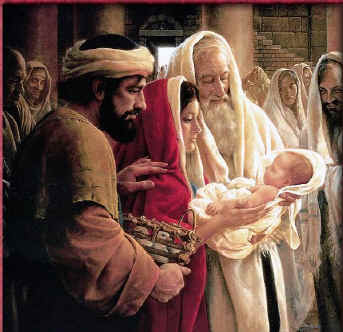The
Feast of the Holy Name
January 1
 In
Jesus' culture, who you were was largely about who your parents were. Your name,
your identity in the world, was your family name, and especially your father's
name.
In
Jesus' culture, who you were was largely about who your parents were. Your name,
your identity in the world, was your family name, and especially your father's
name.
But
it was widely known that Jesus' father wasn't Joseph. It meant that Mary his
mother faced the possibility of death at the hands of a brother or father
seeking to protect the family honour. Joseph had a price to pay as well for his
refusal to abandon Mary; it's most likely that his family disowned him, or he
and his wife would have been able to stay with extended family for Jesus' birth.
It
also means that Jesus was subjected to whispers in the village until the day he
left it. He was called “the son of Mary” (Mark 6:3). Everybody knew that
nobody knew who his father was, and everybody knew that Mary's name was no
status symbol, given her pregnancy by someone other than Joseph. “That young
man will come to no good,” people murmured as Jesus walked past, “no family,
no honour.” His parents' iniquities would be visited upon him, and his name
was mud.
And
yet this Sunday, when we remember his naming, is the Feast of the Holy Name. God
gave him “the name that is above every name,” God gave Jesus the name that
is above every name because Jesus, the most powerful person on earth, didn't
exploit that power to try to seize the throne. He didn't seek the company of the
powerful, but he used his power to exalt the powerless, restoring the outcast to
community and ascribing dignity to those the world despised. He met them with
compassion born of experience, because he shared their name in other's eyes.
God
exalted him, lifted him up, and Jesus lifted up his sisters and brothers among
the despised. Jesus carries the name at which every knee should bow, but he
teaches his followers that they will find and serve him by seeking and serving
those furthest from the center of power -- the sick whose illnesses render them
impure, the prisoners literally barred from community, the poor beggars outside
the city gate.
That's the heart of why we call him the Son of God: because Jesus does what his Father does, and Jesus' words and example, his life and his death, taught us that his Father, the God of Abraham and Sarah, of Isaac and Rebecca and Rachel, is always at work on the margins. God looks at those whose name is mud and calls them his own beloved child, made in his image and deserving the reverence that comes from being mindful of that.
Acknowledgements:
Text adapted from SarahLaughed
Image from Paintings
of Jesus